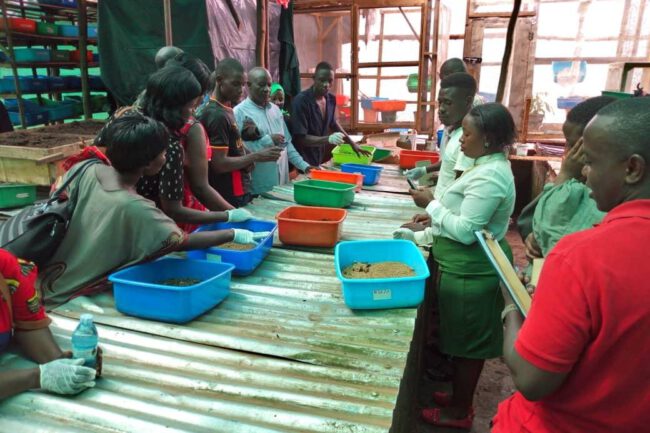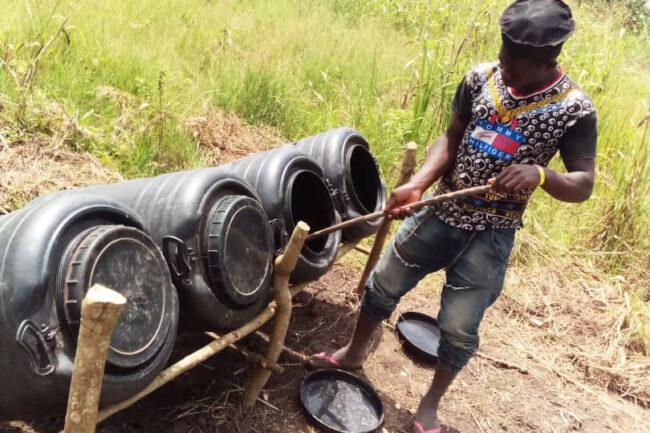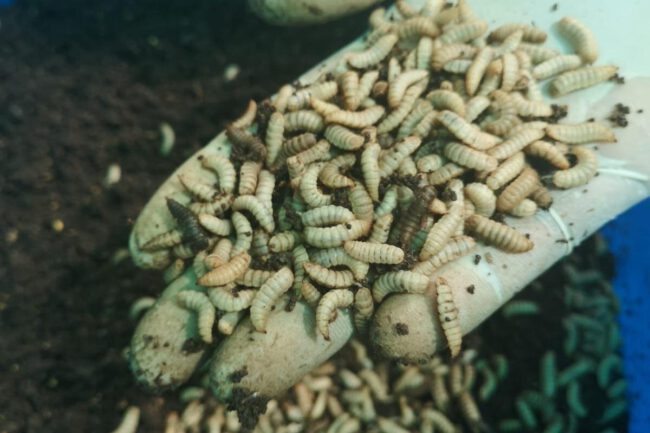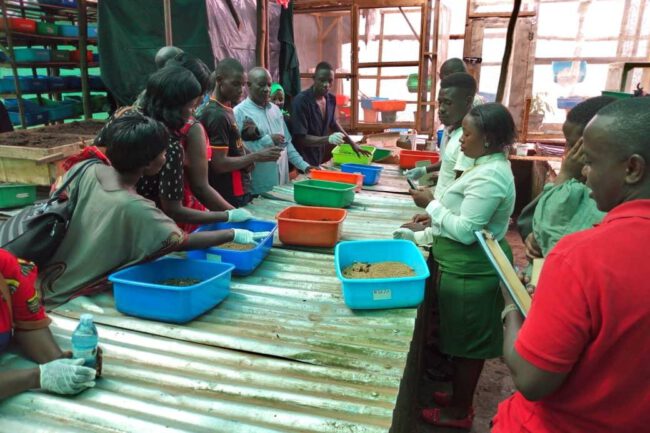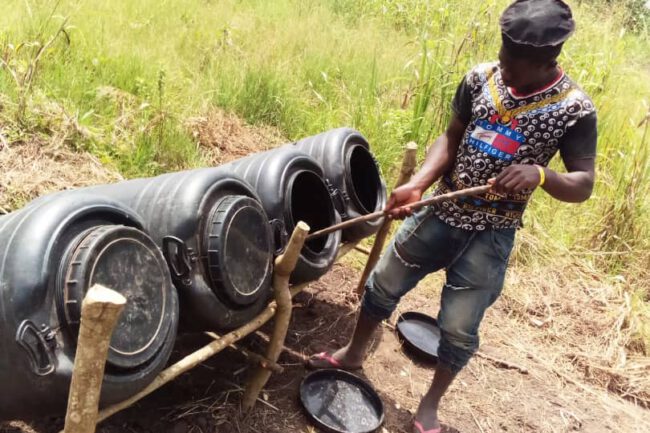Marula Creative Consultancy is a social impact agency specializing in creative storytelling and campaigns for positive change. We are a social enterprise powered by youth, local knowledge and creativity. We provide services to both international and local companies with social impact projects in Uganda. These services include; project management, creative M&E reporting, storytelling and media.
The Problem
Marula Creative Consultancy is tackling three key problems: inefficient waste management systems, food production challenges, and high youth unemployment in Uganda.
Inefficient waste management systems
Currently, 69% of organic waste in Sub-Saharan Africa is dumped or burned, accounting for nearly half of all carbon emissions. In Uganda, 80% of the generated waste is organic and only 40% is collected, with still no value-added. In Kampala alone, 480MT of organic waste are taken to landfills per day. The barrier to preventing this problem is the lack of an organic waste market required to fund sustainable waste management systems to formalise employment opportunities.
Food production challenges
Secondly, to increase food production by 70% to feed the future population of 9.5b, we need sustainable and affordable protein and fertilizer sources. Currently, aquaculture, one of the cheapest ways to feed people (low feed conversion rate), has been fueled by fishmeal (silverfish in Uganda). However, barriers include significant environmental (overfishing) and cost (fluctuating prices) constraints (Appendix 1E for environmental effects of fishmeal). Moreover, silverfish farming is aggressive, territorial and dangerous for many youth to engage in.
High youth unemployment
Thirdly, 80% of jobs in Uganda are in agriculture, but with a 64% youth unemployment rate there has to be a focus on providing new youth employment opportunities. Accessibility to land, financial resources and the preference for “quick money” are a constant barrier for youth to engage in the agricultural sector.
The Solution
Transforming Uganda’s organic waste by feeding the future through sustainable animal feed and organic fertilizer. Turning Kampala into the first green city in East Africa by 2025.
New animal feed supply chain
By September 2022, our project will provide 2000 youth farmers (60% female) the opportunity to produce 32MT of insect-based livestock feed earning them a sustainable income. By directly employing 105 youth, we support these farmers through egg breeding (15 youth, 50% female), extension work (50 youth, 100% female), and larvae processing (40 youth, 50% female) creating a new animal feed supply chain in the country.
Our project consists of three key areas: investing in Proteen urban warehouses, building Proteen breeding Hubs (urban and rural link), and developing a rural out grower scheme.
Investing in Proteen urban warehouses
Currently, the Proteen warehouse transforms 40MT of waste to create 8MT of protein feed per month. By scaling up this SME, in 2022, the warehouses will divert 39,000MT of waste or 6.2% of Kampala’s collected organic waste per month leveraging circular economy principles. Through youth targeted HR strategies, 40 youth from all levels of education will be employed, creating 1,465MT of protein feed, 9,750MT of fertilizer, and 731MT of oil supplement, generating a revenue of €6,186,375 (Appendix 1E for market pricing). We aim to process 25% of Kampala’s organic waste, enabling Kampala to become the first East African green city in 2025.
Building Proteen breeding Hubs
Additionally, this project will establish 5 Proteen Hubs, which each recruit 3 youth, to breed 300 kg of ‘5-day-old-larvae,’ (BSF dol) per week, the most complex part of the BSF process. Each Hub works with 8 collection centres, run by trained extension workers, who then train and work with 5 clusters of 10 farmers (50 farmers).
Through microfinance loans, youth farmers are able to purchase our ‘BSF Systems’ innovation – a small scale production unit which requires 400kg of organic waste every two weeks to create 32kg of protein and 100kg of organic fertilizer per week.
Developing a rural out grower scheme
To solve the problem of effective waste management in Uganda, we transform waste to value. Through transforming urban warehouses into vertical insect processing farms, we bring our solution close to city waste. Proteen has collaborated with KCCA (Kampala Capital City Authority) successfully for the past 8 months to transform and process 230MT of organic waste. In urban settings, the most effective strategy is to bring waste to the flies, whilst in a rural setting, we bring the flies to the waste through our ‘BSF Systems.’
Secondly, we need sustainable and affordable, protein and fertilizer sources, to solve the current feed and crop productivity crisis. The BSF market is forecasted to reach €2.3 billion by 2030 as a viable replacement to fishmeal and organic fertilizer. Our BSF Systems are sold to farmers through a micro-finance scheme leveraging a revolving fund with the MasterCard Foundation, to enable access to youth. Furthermore, Enimiro has experience in integrating agricultural systems that focus on maximizing farmer incomes with limited land resources in an environmentally sustainable method. Several proven successful methods in other crops were used in the design of this project. Such as incorporating digital traceability and data collection systems developed by Metajua (originally from the coffee and vanilla sector). This deeper understanding of the challenges faced by farmers, such as intercropping for food security, is a change of methodology from traditional projects.
As this consortium is focused on bringing a new innovation and supply chain to Uganda there is no risk of displacing other jobs. Only 40% of organic waste in the country is currently being collected, and most of that waste is given no second life, leaving a large gap. Adding value to this resource provides the additional benefit of addressing the challenges of the protein shortage.
Additionality
CFYE has allowed Marula to bring together Proteen and Enimiro in a partnership to tackle youth unemployment in Uganda. The fund budget will enable us to build Proteen ‘Hubs’ which is the missing link between the urban warehouses (SME solution) and the rural extension network (farming entrepreneurs). With one warehouse we produce 124MT of larvae every month, through an established out-grower scheme, we can scale our production by 240MT and improve the livelihood of 2000 youth farmers.
Enimiro, who was already providing BSF solutions to their registered farmers can now remove the pressure of the most complicated part of the process, ‘breeding,’ and rely on Proteen to provide 5-day old larvae. Farmers can then focus on scaling up, getting a new source of revenue, and improving their other productions through the organic fertilizer. This diversification of incomes for farmers is a benefit to Enimiro and other future partners, as it makes farmers less dependent on one crop. E.g. If coffee prices drop, partners can be less scared that farmers pull out their trees as they have diversified incomes.
Without the fund, both Proteen and Enimiro will continue to expand, however, this fund enables the Hubs to be built which streamlines the supply chain, reduces risk, and allows each partner to focus on their key competences. Furthermore, whilst partners have experience with youth projects, our project will have an added focus of employing 1272 female youth. A GESI TA will allow us to ensure that the project is inclusive.
Following the success of our pilot, CFYE support will allow us to complete our circular model by setting up innovative Material Recovery Center. Which to date has not yet been achieved in the country. There are a few initiatives that look at plastic recycling, but none that combine the organic component. It will allow us to scale up our current initiatives and de-risk our business model by ensuring that our main input, organic waste, can be more easily secured.

